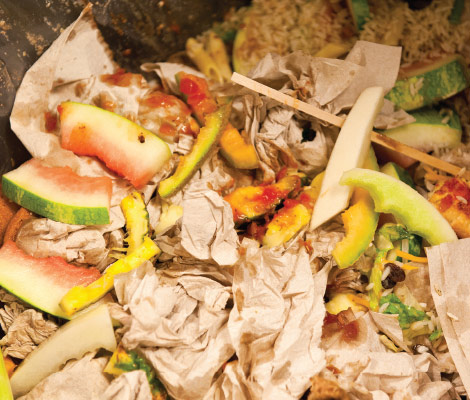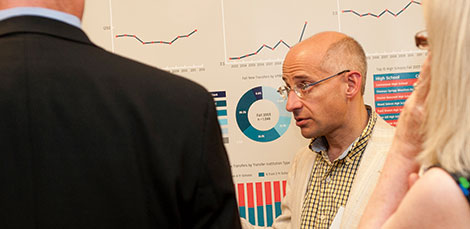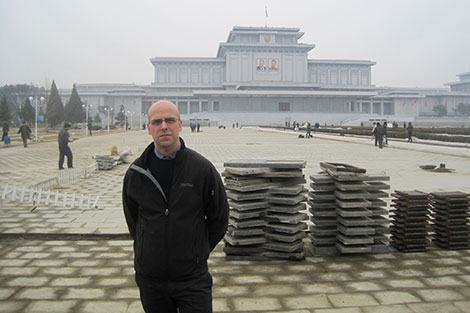Most people stop thinking about their trash once they toss it in a bin. But with composting, the bin is only the beginning.
“Composting is a way to make food waste into new food growth,” explains Madeline Hall ’12, geography and environmental systems, who was a key player in establishing a composting program at UMBC. “It’s a way to bring the process full circle.”
Even before she became a Student Government Association sustainability intern in 2011, Hall was working to show that composting was something students really wanted. But before composting could become a part of UMBC’s sustainability efforts, Hall needed to forge a new relationship between the university (which oversees campus waste disposal) and Chartwells (which holds the university’s catering contract). And because UMBC’s Campus Card Office oversees the Chartwells contract, it also became involved with compost planning.
Angie Hammerbacher, manager of the Campus Card Office, worked with Hall to sort out the logistics of composting on a large scale. “It’s just the natural direction UMBC was going in,” says Hammerbacher. “The community understood that something needed to be done to promote sustainability on campus, and composting was one of the ways we could do that.”
Because of UMBC’s size, the accumulated waste needs to be taken off campus to be composted. So the university signed a contract with Waste Neutral to do so, and composting was introduced into the True Grits dining hall in July 2011.
True Grits employees are trained to recognize compostable material, which includes not only food waste but also paper products without a plastic coating. This waste is taken to a special dumpster outside the dining hall, which is emptied by the contractors twice per week.
UMBC’s composting is carried out almost completely behind the scenes, so student advocacy is a key element in building a constituency for the effort. Brent Mattox ’13, computer science, continued Hall’s efforts when he took on the sustainability intern post last year.
“At the end of the day, our success is all about outreach,” says Mattox. “It starts with the students—if people see that we really want it, they’ll start to make the changes too.”
Mattox organized composting at large campus events such as Quadmania and EcoFest to help advertise the program. He also helped implement an extension of UMBC’s composting program to The Commons in February.
To date, 107.77 tons of waste has been composted at UMBC between the dining hall, The Commons and campus events.
“Composting at UMBC is unique because so many people have to come together to make it happen,” says Hall. “And to do that at a time when resources could easily be allocated elsewhere—that really shows our campus’ commitment to sustainable actions.”
– Laura Lefavor’13
Tags: Fall 2013




